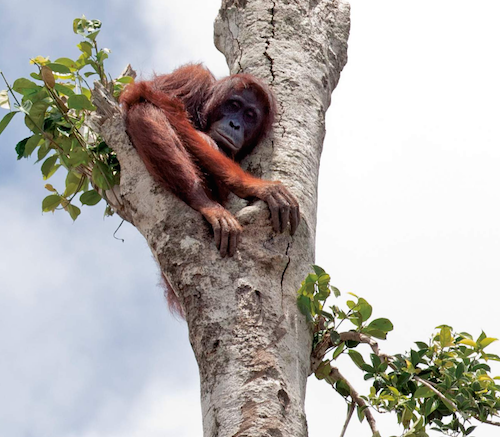This undercover footage by Greenpeace shows bulldozers destroying Indonesian rainforest. HSBC, one of the biggest banks in the world, is accused of lending millions to palm oil companies in the Salim group, which is claimed to be behind this destruction.
British-based group HSBC, Europe’s largest bank, has been accused of being a “dirty banker” by funding companies alleged to be destroying forests in a new Greenpeace report.
HSBC is currently one of the largest providers of financial services to the palm oil industry, according to the report.

concession in Ketapang, West Kalimantan, Indonesia.
© Alejo Sabugo/IAO Indonesia/Greenpeace
HSBC has detailed policies on forestry and agricultural commodities (including specific sections on palm oil), Greenpeace says.
The banking group claims these policies “prohibit the finance of deforestation”, but the new Greenpeace report shows many of the companies it funds are destroying forests.
Since 2012, HSBC has been involved in arranging loans and other credit facilities totalling US$16.3bn for the six companies profiled in Greenpeace’s Dirty Bankers report, as well as nearly US$2bn in corporate bonds.
In some cases, details of contributions made by each lender (including HSBC) are accessible, but for many deals this information is not available.
Greenpeace says these case studies show that not only are HSBC’s policies inadequate, but the group is providing services to companies that breach them. HSBC links to some of the most damaging companies in the sector leave the group exposed to serious reputational risk, in addition to the financial risks associated with the palm oil industry.
Evidence that these companies were responsible for “unacceptable activities” is in the public domain: they have been subject to Roundtable on Sustainable Palm Oil (RSPO) complaints or suspension, been cited by the Indonesian government for unrestrained fires and/or been the subject of numerous critical reports from social and environmental non-governmental organisations (NGOs).
“Even the most basic due diligence on these companies should have set alarm bells ringing, which raises the question: is HSBC failing to apply its policies altogether, or just failing to apply sufficient scrutiny when assessing whether current or prospective customers comply?” asks Greenpeace in this report.
‘Blood on its hands’
Greenpeace New Zealand forests adviser Grant Rosoman said the connection between palm oil and massive rainforest destruction was a global issue that countries around the world must take responsibility for.
“Even in a small country like New Zealand we’ve seen that our agriculture industry has been complicit in fuelling the draining of peatland in Indonesia and the devastating fires that followed,” he said.
“And now we’re seeing that Europe’s largest bank, HSBC, also has blood on its hands. HSBC has many branches here in New Zealand. As a global bank, this means that every office – even the ones here – have been linked to financing destruction.”
Rosoman said companies in Indonesia’s palm oil sector used “deliberately complicated” corporate structures to avoid scrutiny.
But by analysing corporate financial data and company accounts, as well as through field research, Greenpeace International had traced those responsible for forest destruction back through their parent companies to HSBC and a host of other international banks.
Nilus Kasmi Seran, an indigenous Dayak and volunteer firefighter from Ketapang, West Kalimantan, said: “The smoke that comes from clearing forests and draining peatlands puts my family in danger, year after year.
“The banks and companies driving this crisis must take responsibility for polluting our air.”
Last year the International Union for Conservation of Nature changed the classification of the Bornean orangutan from “endangered” to “critically endangered”, citing “destruction, degradation and fragmentation of their habitats” including conversion to plantations, as a main reason for the decline in population.
Greenpeace analysis of figures released by the Indonesian Ministry of Environment and Forestry suggest 31 million hectares of Indonesia’s rainforest has been destroyed since 1990 – an area nearly the size of Germany.
Indonesia has now surpassed Brazil as the country with the world’s highest rate of deforestation, and today less than half of its peatlands remain forested.
HSBC response
According to the Greenpeace report, when presented with the financial data and evidence of policy breaches documented, HSBC stated that it was preparing a review of the bank’s exposure to the palm oil sector following requests from interested parties, including Greenpeace.
Preliminary figures from the review show that since 2014 the bank had closed relationships with 93 customers in the palm oil sector, in most of these cases because the customers “do not or do not wish to meet HSBC’s policy”, Greenpeace reported.
However, HSBC was unwilling to name any of these customers, stating that “customer confidentiality restricts us from commenting on specific relationships”.
A further 83 customers were judged to have met or be “on a credible path” toward complying with its policies. HSBC did not state how many customers overall it had in the palm oil sector, Greenpeace reported.














































Any country clearing own degraded forest for food and energy security within own sovereign border is very much legitimate economic activities. Greenpeace sensationalizes this as ‘deforestation’ cause HSBC has not paid enough to the blackmail.
Comments are closed.